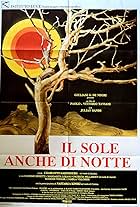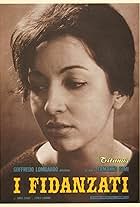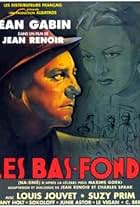Adicionar um enredo no seu idiomaDedee is a prostitute who works in Monsieur Rene's nightclub on Antwerp's harbour. The porter is Marco, her pimp. Dedee is not happy until she meets Francesco, an Italian sailor. They fall i... Ler tudoDedee is a prostitute who works in Monsieur Rene's nightclub on Antwerp's harbour. The porter is Marco, her pimp. Dedee is not happy until she meets Francesco, an Italian sailor. They fall in love and Dedee starts to dream about escaping her daily dull grind.Dedee is a prostitute who works in Monsieur Rene's nightclub on Antwerp's harbour. The porter is Marco, her pimp. Dedee is not happy until she meets Francesco, an Italian sailor. They fall in love and Dedee starts to dream about escaping her daily dull grind.
- Direção
- Roteiristas
- Artistas
- Prêmios
- 1 indicação no total
- Francesco
- (as Marcel Pagliero)
- La prostituée allemande
- (as Catherine Farell)
- Le diamantaire
- (as J. Van Cottom)
- Petit rôle
- (não creditado)
Avaliações em destaque
Into his menage enters Marcello Pagliero, a sailor who engages in some sort of illicit trade -- It's a Gabin sort of role, were this not a vehicle for Mlle Signor. Blier eyes him as marriage material for her, and soon they are much in love.
It was directed for Mlle Signoret by her then husband,Yves Allégret, and clearly intended as Marcel Carné poetic realism sort of movie; Allégret uses many actos who played for Carné. It's a poor effort, almost a burlesque of the form, but Mlle Signoret is luminous, and Blier is excellent.
At the time, the logic goes, poetic realism was no longer a thing, it was outdated, passé, old-fashioned. Well I contend that a good movie remains a good movie, in or out of fashion. Even if it was released yesterday, so even more so if it's as old as your granny.
For a start, as everyone acknowledges,, there's Simone Signoret. Not only (very) beautiful, but a powerful, tragic figure that fills the screen. As soon as you see her, you know you can expect... OK no spoilers.
Then there's a strong, memorable story. This is an important ingredient in poetic realism, as it gives weight to the atmospheric sets. That is part of why Le Jour se Lève or Liliom are so good. Dédée d'Anvers is in that class. People have compared it unfavourably with Quai des Brumes. Well I find that, for all its spender, that movie has a somewhat meandering, confused story that makes you wonder what all the atmosphere is about.
The influence of that masterpiece of poetic-realism 'Quai des Brumes' is there for all to see although the dialogue of Jacques Sigurd ensures there is far less poetry than realism. Despite oodles of atmosphere courtesy of lighting cameraman Jean Bourgoin and a talented cast this does rather pale in comparison with the earlier film.
Superlative Bernard Blier(father of Bertrand) is both tough and tender as nightclub owner Monsieur René whilst Marcel Dalio relishes his role as Dédée's crapulous pimp. Jane Marken does a nice turn as a tart with a heart. Marcello Pagliero is suitably laconic as Francesco, the ill-fated hero but his character is under-written and he is no Jean Gabin! The scenes between Blier and Signoret are excellent and Allégret was to pair them again to great effect two years later in 'Maneges'.
In the title role La Signoret not only has star quality in spades but exhibits an unbeatable combination of sensuality and vulnerability. Suffice to say husband Allégret ensures that she is lovingly lit and almost caressed by the camera.
For any film to have the desired effect it is essential to have at least a good opening and ending. The opening scene here is nothing less than iconic whilst the ending is nothing short of devastating and still guaranteed to shock.
Jacques Sigurd,Allégret's script writer , provided the director with solid material which would become better and better along the years.Their three best works were arguably "une si jolie petite plage" (1949) "manèges"(1950) which reunited the threesome Signoret-Blier-Marken for what was probably Allégret's peak and "les orgueilleux".(1953).After that movie,it was downhill.
There is an ease of storytelling and work with actors that shouldn't blind us to the reality that Allegret is working in a genre--poetic realism--that is worn out in the late Forties. Jacques Sigurd wrote seven scripts for Allegret, but he was never the equal of Jacques Prevert, either in creating memorable characters or great lines. The port setting and cast of desperate dreamers had been used before in Carne's Quai des brumes, with the exception of the shady life of Signoret's character, quite a change from Michele Morgan's purity.
The actors are all fine. Jane Marken and Dalio bring out the emotions of their characters--lively, not too smart, trusting and suspicious by turns. Marcel Pagliero is sturdy, quiet and trustworthy; he's at ease in front of the camera, the way Sergio Castellitto is today (he even looks a lot like Castellitto). Bernard Blier is sometimes sympathetic, sometimes contemptuous with his employees--it should be noted that Marco is a handful for even the strongest boss. This was Signoret's fifteenth film, and it finally launched her career. Her Dedee is beautiful, in that sculptural way she had, lively, smart and moving. She provides a good account of the making of the film in her autobiography, Nostalgia Isn't What It Used to Be.
Você sabia?
- CuriosidadesMarcelle Arnold's debut.
- ConexõesFeatured in Legendy mirovogo kino: Simone Signoret
Principais escolhas
Detalhes
- Data de lançamento
- País de origem
- Central de atendimento oficial
- Idiomas
- Também conhecido como
- Dedee
- Locações de filme
- Empresa de produção
- Consulte mais créditos da empresa na IMDbPro
- Tempo de duração1 hora 40 minutos
- Cor
- Proporção
- 1.37 : 1
Contribua para esta página



























